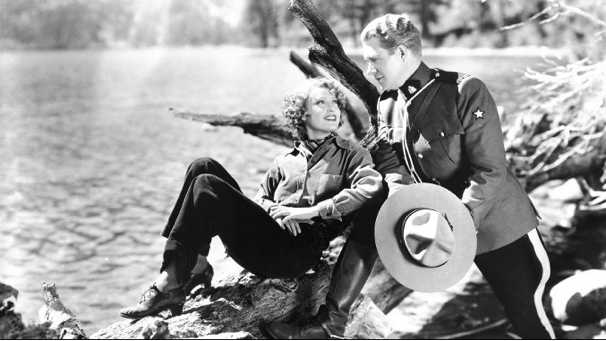It’s likely that Canada has doubled for every state in the union at least once in countless Hollywood productions filmed in places like Vancouver, Toronto and Montreal over the years. But it may come as a surprise to discover that the United States itself has doubled for Canada in nearly 600 films produced during Hollywood’s golden age!
From the Biograph two reelers of the early 20th century to the Disney wilderness pictures of the 1960s, Canada or the “Northwoods” as it was often referred to and portrayed as, served as the wild and beautiful fantasy backdrop of many pictures depicting brave mounties, wayward women, noble Indians, and devious Frenchmen. These mainly B-pictures, shorts and serials starred the likes of Errol Flynn, Rock Hudson, Tyrone Power, Bela Lugosi, Shelly Winters, Anne Baxter, Shirley Temple and some were directed by household names such as Cecil B. DeMille, Michael Curtiz, John Ford, and Alfred Hitchcock.
After they fell out of fashion in the middle of the last century, most of these films have been forgotten, often left out of film retrospectives, cable programming rotations and buried deep within DVD collections if they are released at all. The simple reason for this is that most of these films were rather mediocre pulp, depicting Canada as an endless expanse of mountainous wilderness populated by stock Hollywood Indians and Mounties who acted more like cowboys than their real-life counterparts ever did.
Nevertheless, this body of work is key to understanding how the world and Canadians themselves came to see Canada in popular culture and how this continues to influence our country’s depictions on-screen (or lack there-of). One picture that came to best represent this crop of faux-Canadian films is the 1936 MGM adaption of the 1924 Broadway Operetta Rose-Marie.
In this heavily altered plot of the source material, the story begins with beloved soprano Marie de Flor (Jeanette MacDonald), performing to a packed house in Montreal. After the performance, she receives word from a mysterious Metis, Boniface (George Regas) that her brother Jack (James Stewart in an early role) has escaped from the penitentiary and killed a Mountie in the process. Aiming to reach him before the Mounties do, Marie promptly flees to the backcountry with Boniface as her guide. But when he makes off with her money and supplies, local Mountie Sergeant Bruce (Nelson Eddy) takes pity on her, offering to help the city woman navigate through the beautiful, but treacherous terrain to her destination.
As their journey takes them through towering woods, majestic hills and sparking lakes (actually Lake Tahoe subbing in for Quebec), they gradually begin to fall in love, finding a piece in the other that their lives have been sorely lacking. Little does Marie realize however, that Bruce has figured out that Marie is Jack’s sister and intends on following her straight to the fugitive so he can nab his man and bring him to justice. Will he choose love over duty? Only the final act knows for sure!
A healthy dose of suspension of disbelief is required for any classic Hollywood musical and Rose-Marie is no exception. The film plays fast and loose with Canadian geography with the lushly photographed California wilderness only barely resembling the Quebec backcountry. Even more liberties are taken with a sequence depicting an “Indian Festival” which manages to incorporate something from nearly every Indigenous culture on the continent including Plains headdresses, Aztec breech clouts, and a bizarre mix of coast Salish totem poles.
Factual inaccuracies aside, the film manages to weave a decent tale to satisfy it’s target audience. Jeanette MacDonald conducts herself well as a self-centred opera star broadening her horizons while Nelson Eddy is adequate as a red-blooded Mountie torn between love and honour. The two are at their best when their tenor and soprano voices combine in their signature song “Indian Love Call” (and this is coming from a guy who doesn’t particularly care for opera!), but I’d be lying if I said their relationship doesn’t come off as slightly forced given it’s rather rushed development and Bruce’s forward and inappropriate advances in several scenes.
The supporting cast is a veritable who’s-who of Hollywood character actors at the time including Reginald Owen as Marie’s overwhelmed manager Myerson, the charming Una O’ Connor as her caring assistant Anna, and watch for a cameo of the legendary David Niven as her tireless suitor Teddy! I’d have kinder words for George Regas as the treacherous Boniface if it wasn’t part of the relentless and unfortunate “half-breed” stereotype that Hollywood screenwriters saw fit to impose on the Metis people.
Being an Operetta, the songs (including lyrics co-authored by Oscar Hammertsein II) aren’t quite my cup of tea. While the harmonies between the two stars on “Indian Love Call” are undeniably powerful, my favourite track came in the form of the twilight serenade that Eddy warbles to MacDonald “Rose-Marie, I Love You” which aside from being memorable, manages to poke fun at itself by having Marie ask if Bruce “composed it in the spur of the moment!”
In the end, the film is a curious sojourn into how a generation would come to view Canada, her land and her people. It can be irritating and downright offensive depending on who’s watching, but it also posses an undeniable earnestness and charm that only classic Hollywood could create. Viewed with a proper frame of mind and a dose of good humour, it’s a two-hour journey worth taking.
6.5/10

